China Celebs
Six Years after Chinese Pop Star Zhang Muyi (24) Declared Love for 12-Year-Old Miki Akama, They’re Now Tying the Knot
Zhang Muyi became her music coach when Miki Akama was only 8 years old. A decade later, the couple announces their wedding on Weibo.
Published
6 years agoon
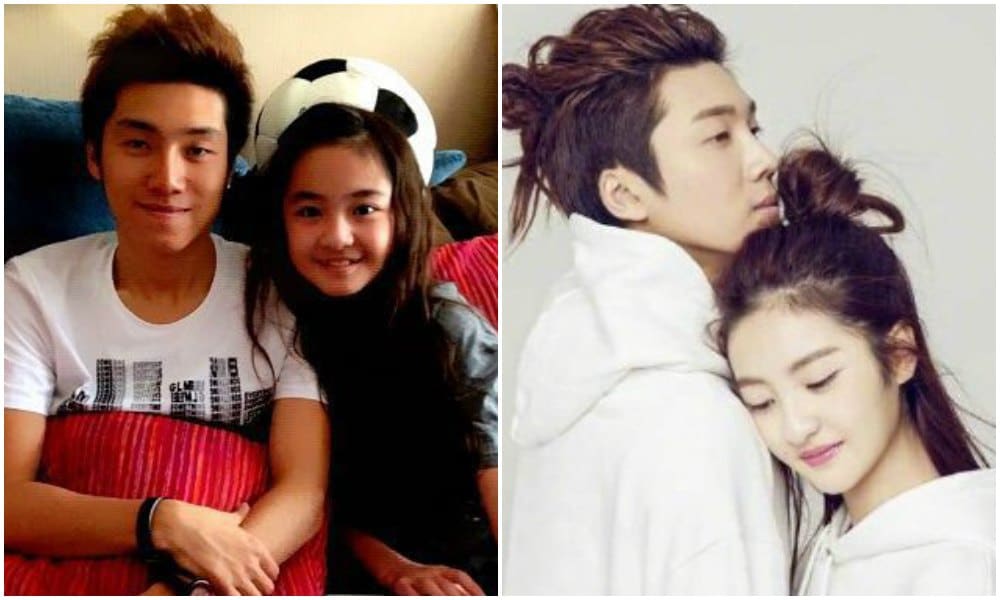
Six years after Chinese pop star Zhang Muyi (1987) publicly declared his love for the then 12-year-old music pupil Miki Akama (2000), the two have now announced their wedding on Weibo. Although some say their love is meant-to-be, others say it is a case of pedophilia.
In 2012, it made international headlines when the then 24-year-old Chinese popstar Zhang Muyi publicly declared his love for 12-year-old Canada-born model Miki Akama.
The two met when Zhang Muyi was hired to be Miki’s music coach when she was only 8 years old. In 2012, Muyi wrote on Weibo that he “simply couldn’t wait” for Miki’s next four birthdays to pass, saying he was “counting down each one.”
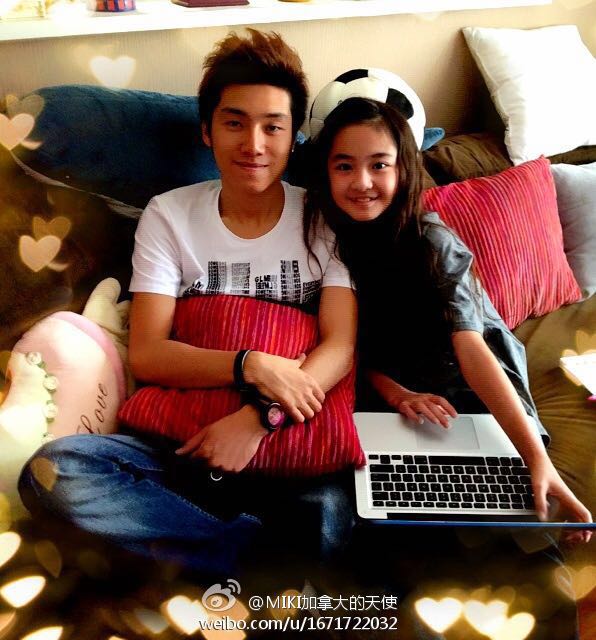
24-year-old Zhang and 12-year-old Miki in 2012.
At the time, the 12-year-old Miki, whose mother is Chinese/German and whose father is Japanese, had already built up a fanbase of 500,000 followers on Weibo. She replied to Zhang, saying: “Wait until I’m old enough to marry you, and then I’m going to say “I do”.’
Six years later, the now 30-year-old Zhang Muyi (@张木易, 1.4 million followers on Weibo), and the 17-year-old Miki Akama (@张千巽, 1.8 million Weibo fans) have announced their wedding through social media.
On April 4, Zhang wrote on Weibo: “You’ve made me see the most beautiful picture in this world,” adding a photo of a wedding dress. Miki responded to the post, writing: “You make me as beautiful as I can be.”
He later added: “We are indeed preparing for our wedding in all kinds of ways. On September 11, 2018, Miki will turn 18, and it will be ten years since we first met.”
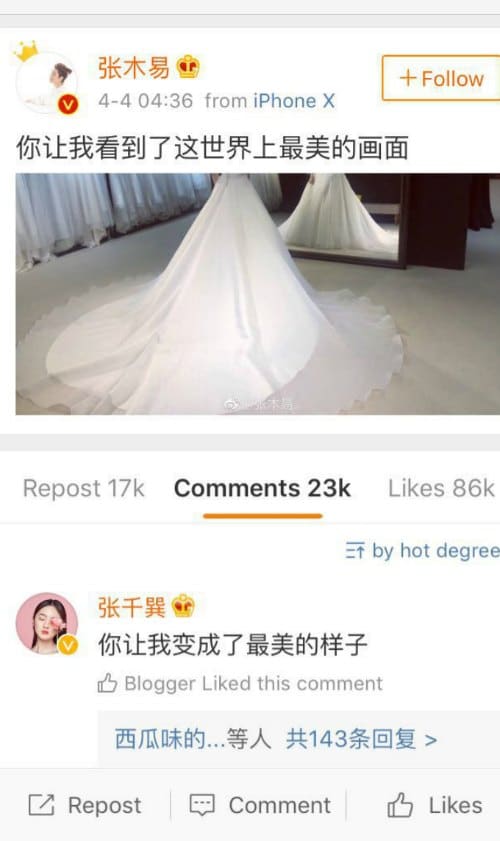
The wedding announcement prompted a wave of reactions. Within 48 hours after the post, Zhang’s photo had received 23,800 responses and nearly 18,000 shares. The couple became one of the most-searched hot topics on social media in China on April 6, and the hashtag “Zhang Muyi and Miki Akama Getting Married” (#张木易张千巽结婚#) received more than 85 million views by Friday.
Although there are many netizens who wish the couple a happy life and find their story romantic, there are also many opponents who think the base of the couple’s relationship is unhealthy.
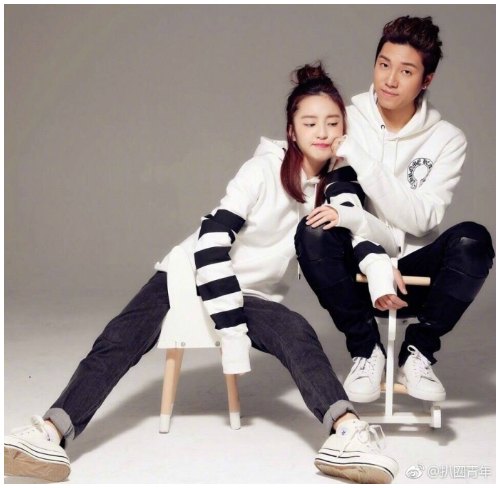
Weibo account @LoveMatters (an account affiliated to RNW Media) writes:
“In most parts of the world, it is hard to give blessing to a relationship between a teacher and their student. The fundamental reason for this is that there is an unequal power relation between teachers and students, which makes it difficult to speak of an equal and truly harmonious connection between two people. Let alone if one of the two persons is underage; this further intensifies the unequal relationship in terms of knowledge and experience. Let’s not even focus on whether or not this is pedophilia.”
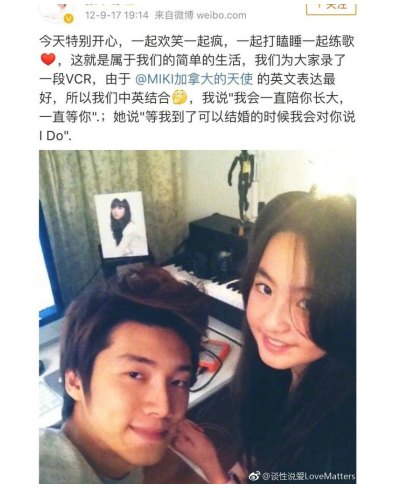
“We should discuss this from the angle of pedophilia,” one netizen responds: “Because even though it is now disguised as ‘romantic love’, its base still essentially is the relationship between an adult and an 8-year-old girl.”
Many others also say that this a “white-washing of pedophilia,” with some expressing that it makes them “feel like vomiting.”

In response to the controversy, Miki addressed their engagement on Weibo in a lengthy blog post.
In her statement, Miki expresses the shock at the negativity surrounding their wedding engagement, saying that people are “turning this story into something they want it to be,” and that they are downgrading her to a “brainless girl” who has been “living in the dark” all her life.
“I do want to correct something,” she writes:
“There are people who are changing our story and are using the fact that I was 8 years old [when we met], and in doing so, are harming us and our loved ones. In their articles, they are deleting the part that really matters: When I was 8, I met Muyi and he was my music teacher; teaching me how to sing and teaching me self-confidence. By the time I was 12, my parents had let me read many books and see many movies, and I had a good education at school. Many of my friends with the same age as me had started reaching puberty and I also started to think about who I liked. I could talk to Muyi about everything. He said that when I would reach the age of dating, he would help me check them out. At the time I did not understand what it meant, and he said he would not let me date bad guys, because it is very easy for people to get hurt. Looking back now, Muyi was also still young at that time, so I told him that if he did not want me to get hurt in the future, he should just marry me. At the time we were just joking around, like playing house. With that uncomplicated promise, I grew up with him by my side. Of course, we will stay pure until marriage.”
Regardless of Miki’s statement, many netizens still hold their own opinions about the matter. Some compare Zhang and Miki to the case of the Taiwan lyricist Li Kuncheng (李坤城) and his wife Lin Jingen (林靖恩, 1996).
The couple became a big topic of discussion in 2015, when the then 58-year-old Li tied the knot with the then 18-year-old Lin.

Li Kuncheng with his 40 year younger fiancee in 2015, image via Asianpopnews.com.
About Zhang and Miki, one commenter writes: “I don’t think this is as serious as pedophilia. The goal of pedophilia is unpure [sex], but they have been together a long time. Zhang has no evil intentions.”
Still, many people express their worries about the situation, wondering “where the parents are” in this, and saying that they do not want their own children to be influenced by this.
By now, some experts and KOL (Key Opinion Leaders) have also gotten involved in the matter. While influential Nanjing police officer Wang Haiding (王海丁, @江宁婆婆) condemns the relationship, famous Chinese sexologist Li Yinhe (@李银河) says it does not meet the criteria of pedophilia.
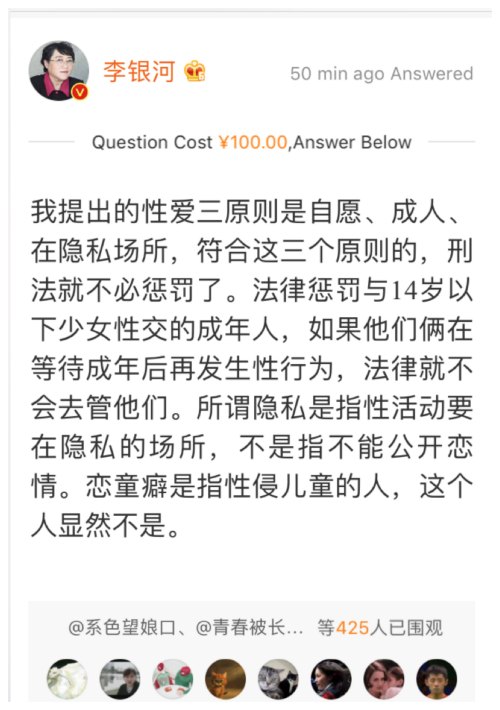
Renowned Chinese sexologist Li Yinhe answers a question on Weibo about whether this is pedophilia or not.
“The three principles of sex that I have proposed are that it is is voluntary, between adults, and in private. If it is in line with these three principles, it is not punishable by law. The law can punish adults who have sex with girls under the age of 14, but if they wait with having sex until they are both adults, then the law cannot control them. (..) Pedophiles are people who sexually assault children. This is clearly not the case here.”
Amidst all controversy and analyses, many netizens just jokingly say: “I’m also ready to meet my future spouse – too bad they’re still in kindergarten.”
UPDATE – see our latest video about this topic here:
By Manya Koetse and Boyu Xiao
Follow @whatsonweibo
Spotted a mistake or want to add something? Please let us know in comments below or email us.
©2018 Whatsonweibo. All rights reserved. Do not reproduce our content without permission – you can contact us at info@whatsonweibo.com.
Boyu Xiao is an MPhil graduate in Asian Studies (Leiden University/Peking University) focused on modern China. She has a strong interest in feminist issues and specializes in the construction of memory in contemporary China.

China Arts & Entertainment
Jia Ling Returns to the Limelight with New “YOLO” Movie and 110-Pound Weight Loss Announcement
After a year away from the spotlight, Chinese actress and director Jia Ling is back, announcing both a new film and slimmer figure.
Published
7 months agoon
January 11, 2024
Chinese actress and director Jia Ling (贾玲) has been trending on Weibo thanks to her upcoming film YOLO (热辣滚烫) and her remarkable weight loss transformation.
Jia Ling is a famous Chinese comedian actress, known for her annual Spring Festival Gala performances. She has been especially successful in the previous years as she made her directorial debut in 2021 with the award-winning box office hit Hi, Mom (Chinese title Hi, Li Huanying 你好,李焕英), in which she also stars as the female protagonist. That same year, audiences saw her as Wu Ge in Embrace Again (穿过寒冬拥抱你).
It has been a while since we’ve heard from Jia Ling, but on January 11, she resurfaced with a Weibo post in which she explained her absence from the limelight.
In her post, Jia wrote that she has spent the entire year working on the YOLO (热辣滚烫) movie, for which she lost a staggering 100 jin (斤) (110 lbs/50 kg). Just as with Hi, Mum, Jia is both the director of YOLO and the lead actress.
According to Jia, it was a tiring and “hungry” year, during which she ended up “looking like a boxer.” She added that the movie, set to premiere during the Spring Festival, is not necessarily about weight loss at all, but about learning to love yourself.
Within a single day, Jia Ling’s post received nearly 60,000 replies and over 855,000 likes.

Jia Ling’s post on Weibo.
The topic became top trending due to various reasons. It is because fans are excited to see Jia Ling back in the limelight and are anticipating the upcoming movie, but also because they are eager to see Jia Ling’s transformation.
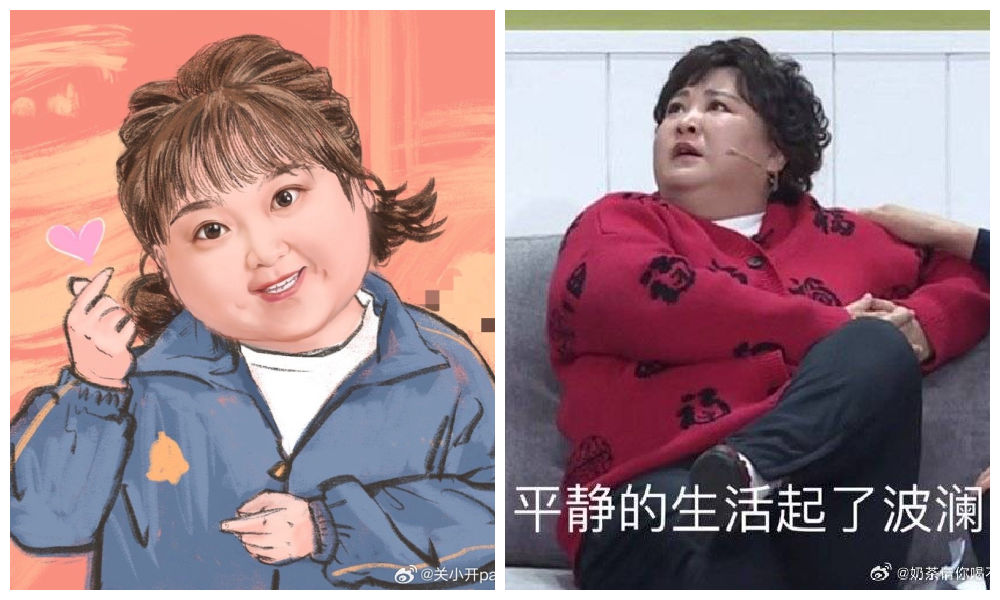
From fans on Weibo: Jia Ling fanart and a meme from one of her well-known Spring Festival performances.
A short scene from the movie showed Jia Ling’s slimmer appearance, and a screenshot of it went viral, with Weibo users saying they hardly recognized Jia anymore.
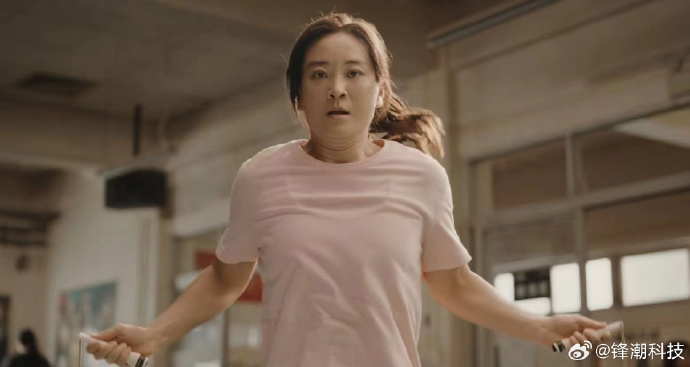
One hashtag related to Jia Ling’s weight loss, about expert views on losing so much weight in such a relatively short time, received over 450 million on Weibo on Thursday (#医生谈贾玲整容式暴瘦#).
Perhaps unsurprisingly, medical experts quoted by Chinese media outlets caution against rapid weight loss methods, recommending a more gradual approach instead.
Nevertheless, there is great interest in the extreme diets of Chinese celebrities. As discussed in an earlier article about China’s celebrity weight craze, the weight loss journey of Chines actors or influencers often capture widespread attention as people are keen to adopt diet plans promoted by celebrities.
YOLO (热辣滚烫), which will hit Chinese theaters on February 10, tells the story of Le Ying (乐莹), who has withdrawn from social life and isolated herself at home ever since graduation. Trying to get her life back on track, Le Ying meets a boxing coach. The meeting proves to be just the beginning of a new journey in life filled with unforeseen challenges.
The Spring Festival holiday typically sees peak box office numbers in China, making this movie highly anticipated, particularly after the success of Hi, Mum three years ago. On Weibo, many view Jia Ling’s weight loss as a testament to her dedication and are eager to see the results of her year-long efforts in the cinema next month.
By Manya Koetse
Get the story behind the hashtag. Subscribe to What’s on Weibo here to receive our newsletter and get access to our latest articles:
Spotted a mistake or want to add something? Please let us know in comments below or email us. First-time commenters, please be patient – we will have to manually approve your comment before it appears.
©2024 Whatsonweibo. All rights reserved. Do not reproduce our content without permission – you can contact us at info@whatsonweibo.com.
China Celebs
Three Reasons Why Lipstick King’s ‘Eyebrow Pencil Gate’ Has Blown Up
From beauty guru to betrayal: why one livestream moment is shaking China’s internet.
Published
11 months agoon
September 13, 2023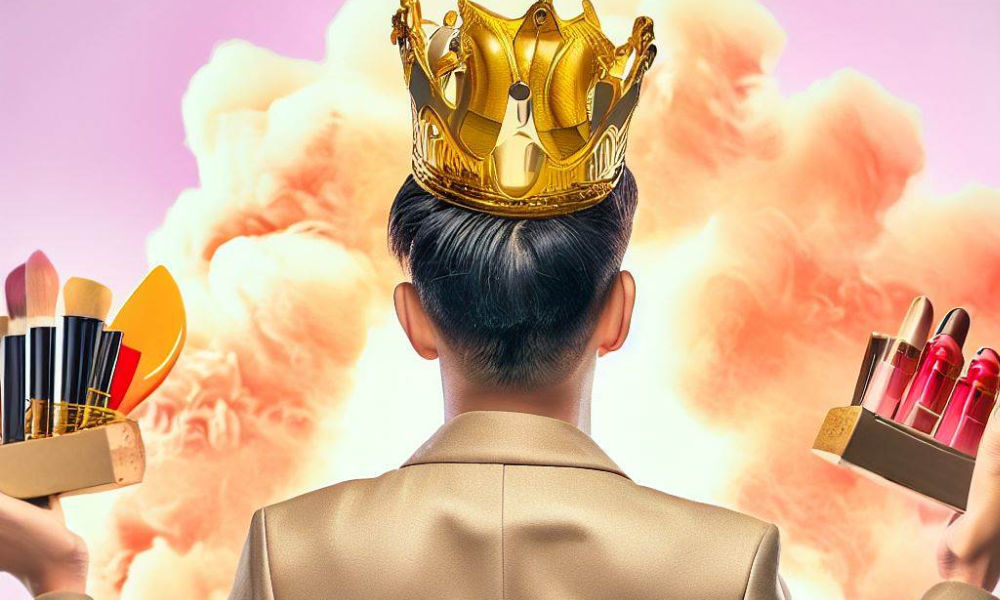
PREMIUM CONTENT
Li Jiaqi, also known as Austin Li the ‘Lipstick King,’ has become the focus of intense media attention in China over the past days.
The controversy began when the popular beauty influencer responded with apparent annoyance to a viewer’s comment about the high price of an eyebrow pencil. As a result, his fans began unfollowing him, netizens started scolding him, Chinese state criticized him, and the memes started flooding in.
Li Jiaqi’s tearful apology did not fix anything.
We reported about the incident here shortly after it went trending, and you can see the translated video of the moment here:
China's famous make-up influencer #LiJiaqi is in hot water due to an e-commerce livestream he did on Sunday. When viewers complained about an eyebrow pencil being too expensive (79 RMB/$10.9), he got annoyed, insisting that the product was not expensive at all. Translated video: pic.twitter.com/JDKGMKovDX
— Manya Koetse (@manyapan) September 11, 2023
The incident may seem minor at first glance. Li was merely promoting Florasis brand (花西子) eyebrow pencils, and some viewers expressed their opinion that the pencils, priced at 79 yuan ($11), had become more expensive.
In response, Li displayed irritation, questioning, “Expensive how?” He went on to suggest that viewers should also reflect on their own efforts and whether they were working hard enough to get a salary increase.
But there is more to this incident than just an $11 pencil and an unsympathetic response.
#1 The King Who Forgot the People Who Crowned Him
The initial reaction of netizens to Li Jiaqi’s remarks during the September 10th livestream was characterized by a strong sense of anger and disappointment.
Although celebrities often face scrutiny when displaying signs of arrogance after their rise to fame, the position of Li Jiaqi in the wanghong (internet celebrity) scene has been especially unique. He initially worked as a beauty consultant for L’Oreal within a shopping mall before embarking on his livestreaming career through Alibaba’s Taobao platform.
In a time when consumers have access to thousands of makeup products across various price ranges, Li Jiaqi established himself as a trusted cosmetics expert. People relied on his expertise to recommend the right products at the right prices, and his practice of personally applying and showcasing various lipstick colors made him all the more popular. He soon garnered millions of online fans who started calling him the Lipstick King.
By 2018, he had already amassed a significant fortune of 10 million yuan ($1.53 million). Fast forward three years, and his wealth had ballooned to an astonishing 18.5 billion yuan ($2.5 billion).
Despite his growing wealth, Li continued to enjoy the support of his fans, who appreciated his honest assessments of products during live testing sessions. He was known for candidly informing viewers when a product wasn’t worth buying, and the story of his humble beginnings as a shop assistant played a major role in why people trusted him and wanted him to succeed.
However, his recent change in tone, where he no longer seemed considerate of viewers who might find an $11 brow pencil to be expensive, suggests that he may have lost touch with his own customer base. Some individuals perceive this shift as a form of actual “betrayal” (背叛), as if a close friend has turned their back on them.

The viral cartoon shows Li Jiaqi going from a friendly beggar to angry rat.
One cartoon shared on social media shows Li Jiaqi, with mouse ears, as he initially begs his online viewers for money. However, as he becomes more prosperous, the cartoon portrays him gradually growing arrogant and eventually scolding those who helped him rise to fame.
Many people accuse Li of being insincere, suggesting that he revealed his true colors during that short livestream moment. This is also one of the reasons why most commenters say they do not believe his tears during his apology video.
“He betrayed China’s working class,” one popular vlog suggested.
#2 Internet Celebrity Crossing the Lines
Another reason why the incident involving Li Jiaqi is causing such a storm is related to the media context in which Chinese (internet) celebrities operate and what is expected of them.
Whether you are an actor, singer, comedian, or a famous livestreamer/e-commerce influencer, Chinese celebrities and performers are seen as fulfilling an exemplary role in society, serving the people and the nation (Jeffrey & Xu 2023). This is why, as explained in the 2019 research report by Jonathan Sullivan and Séagh Kehoe, moral components play such a significant role in Chinese celebrity culture.
In today’s age of social media, the role of celebrities in society has evolved to become even more significant as they have a vast reach and profound influence that extends to countless people and industries.
Their powerful influence makes celebrities important tools for authorities to convey messages that align with their goals – and definitely not contradict them. Through the media and cultural industries, the state can exert a certain level of control within the symbolic economy in which celebrities operate, as discussed by Sullivan and Kehoe in their 2019 work (p. 242).
This control over celebrities’ actions became particularly evident in the case of Li Jiaqi in 2022, following the ‘cake tank incident’ (坦克蛋糕事件). This incident unfolded during one of his livestreams when Li Jiaqi and his co-host introduced a chocolate cake in the shape of a tank, with an assistant in the back mentioning something about the sound of shooting coming from a tank (“坦克突突”). This livestream took place on June 3rd, on the night before the 33rd anniversary of the crackdown on the Tiananmen protests.
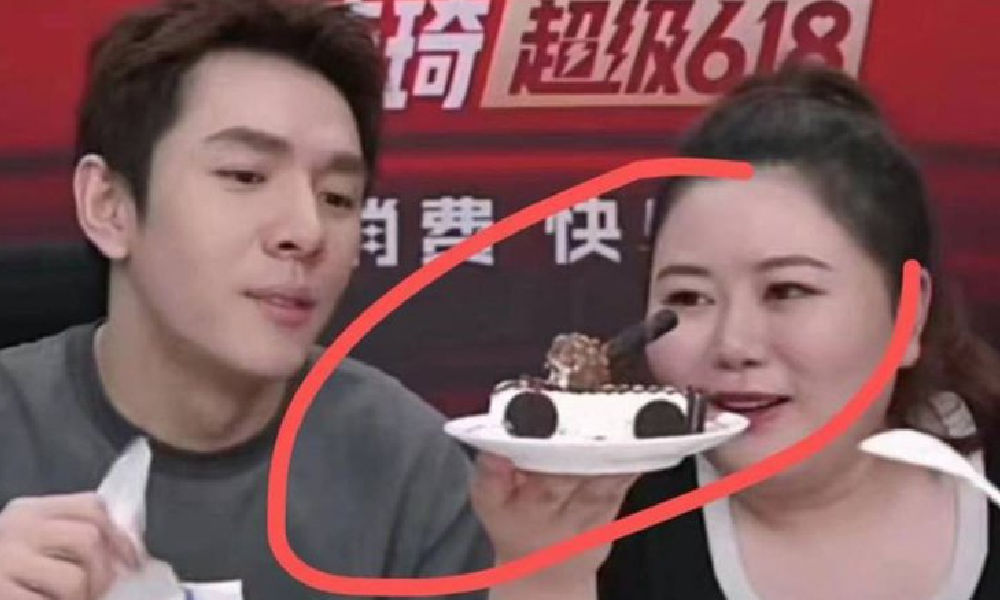
While Li Jiaqi did not directly touch upon a politically sensitive issue with his controversial livestream, his actions were perceived as a disregard for customer loyalty and displayed an arrogance inconsistent with socialist core values. This behavior garnered criticism in a recent post by the state media outlet CCTV.
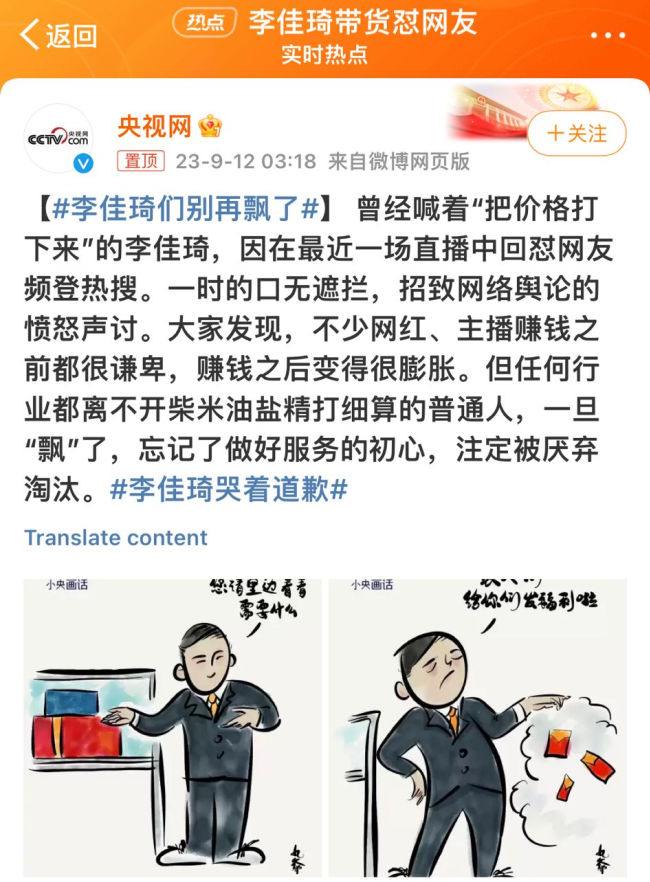
Post by CCTV condemning Li’s behavior.
Other state media outlets and official channels have joined in responding to the issue, amplifying the narrative of a conflict between the ‘common people’ and the ‘arrogant influencer.’
#3 Striking a Wrong Chord in Challenging Times
Lastly, Li Jiaqi’s controversial livestream moment also became especially big due to the specific words he said about people needing to reflect on their own work efforts if they cannot afford a $11 eyebrow pencil.
Various online discussions and some media, including CNN, are tying the backlash to young unemployment, tepid consumer spending, and the ongoing economic challenges faced by workers in China.
Since recent years, the term nèijuǎn (‘involution’, 内卷) has gained prominence when discussing the frustrations experienced by many young people in China. It serves as a concept to explain the social dynamics of China’s growing middle class who often find themselves stuck in a “rat race”; a highly competitive education and work environment, where everyone is continually intensifying their efforts to outperform one another, leading to this catch 22 situation where everyone appears to be caught in an unending cycle of exertion without substantial progress (read more here).
Weibo commenters note that, given China’s current employment situation and wage levels, hard work is not necessarily awarded with higher income. This context makes Li Jiaqi’s comments seem even more unnecessary and disconnected from the realities faced by his customers. One Shanghai surgeon responded to Li’s comments, saying that the fact that his salary has not increased over the last few year certainly is not because he is not working hard enough (#上海胸外科医生回应李佳琦言论#).
Some observers also recognize that Li, as an e-commerce professional, is, in a way, trapped in the same cycle of “inversion” where brands are continuously driving prices down to such low levels that consumers perceive it as the new normal. However, this pricing strategy may not be sustainable in the long run. (Ironically, some brands currently profiting from the controversy by promoting their own 79 yuan deals, suggesting their deal is much better than Li’s. Among them is the domestic brand Bee & Flower 蜂花, which is offering special skin care products sets for 79 yuan in light of the controversy.)
Many discussions therefore also revolve around the question of whether 79 yuan or $11 can be considered expensive for an eyebrow pencil, and opinions are divided. Some argue that people pay much more for skincare products, while others point out that if you were to weigh the actual quantity of pencil color, its price would surpass that of gold.
The incident has sparked discussions about the significance of 79 yuan in today’s times, under the hashtag “What is 79 yuan to normal people” (#79元对于普通人来说意味着什么#).
People have shared their perspectives, highlighting what this amount means in their daily lives. For some, it represents an entire day’s worth of home-cooked meals for a family. It exceeds the daily wages of certain workers, like street cleaners. Others equate it to the cost of 15 office lunches.

One netizen posts 79 yuan ($10.9) worth of groceries.
Amid all these discussions, it also becomes clear that many people are trying to live a frugal live in a time when their wages are not increasing, and that Li’s comments are just one reason to vent their frustrations about the situation they are in, In those regards, Li’s remarks really come at a wrong time, especially coming from a billionaire.
Will Li be able to continue his career after this?
Some are suggesting that it is time for Li to take some rest, speculating that Li’s behavior might stem from burn-out and mental issues. Others think that Li’s hardcore fans will remain loyal to their e-commerce idol.
For now, Li Jiaqi must tread carefully. He has already lost 1.3 million followers on his Weibo account. What’s even more challenging than regaining those one million followers is rebuilding the trust of his viewers.
Update: On September 19, the Florasis/Huaxizi brand finally apologized for its late response to the controversy, and the brand stated that the controversy provided an opportunity for them to listen to “the voice of their consumers.” Their decision to release a statement seemed fruitful: they gained 20,000 new followers in a night.
By Manya Koetse
with contributions by Miranda Barnes
Jeffreys, Elaine, and Jian Xu. 2023. “Governing China’s Celebrities.” Australian Institute of International Affairs, 18 May https://www.internationalaffairs.org.au/australianoutlook/governing-chinas-celebrities/ [12 Sep 2023].
Sullivan, Jonathan, and Séagh Kehoe. 2019. “Truth, Good and Beauty: The Politics of Celebrity in China.” The China Quarterly 237 (March): 241–256.
Spotted a mistake or want to add something? Please let us know in comments below or email us. First-time commenters, please be patient – we will have to manually approve your comment before it appears.
©2023 Whatsonweibo. All rights reserved. Do not reproduce our content without permission – you can contact us at info@whatsonweibo.com.
Subscribe

Weibo Watch: The Future is Here

“Bye Bye Biden”: Biden’s Many Nicknames in Chinese

Enjoying the ‘Sea’ in Beijing’s Ditan Park

A Triumph for “Comrade Trump”: Chinese Social Media Reactions to Trump Rally Shooting

Weibo Watch: Get Up, Stand Up

The Tragic Story of “Fat Cat”: How a Chinese Gamer’s Suicide Went Viral

“Old Bull Eating Young Grass”: 86-Year-Old Chinese Painter Fan Zeng Marries 36-Year-Old Xu Meng

A Brew of Controversy: Lu Xun and LELECHA’s ‘Smoky’ Oolong Tea

Singing Competition or Patriotic Fight? Hunan TV’s ‘Singer 2024’ Stirs Nationalistic Sentiments

Zara Dress Goes Viral in China for Resemblance to Haidilao Apron

Weibo Watch: The Battle for the Bottom Bed

About the “AI Chatbot Based on Xi Jinping” Story

China’s Intensified Social Media Propaganda: “Taiwan Must Return to Motherland”

Weibo Watch: Telling China’s Stories Wrong

Saying Goodbye to “Uncle Wang”: Wang Wenbin Becomes Chinese Ambassador to Cambodia
Get in touch
Would you like to become a contributor, or do you have any tips or suggestions? Get in touch here!
Popular Reads
-

 China Insight3 months ago
China Insight3 months agoThe Tragic Story of “Fat Cat”: How a Chinese Gamer’s Suicide Went Viral
-

 China Music4 months ago
China Music4 months agoThe Chinese Viral TikTok Song Explained (No, It’s Not About Samsung)
-

 China Digital10 months ago
China Digital10 months agoToo Sexy for Weibo? Online Discussions on the Concept of ‘Cābiān’
-

 China Arts & Entertainment12 months ago
China Arts & Entertainment12 months agoBehind 8 Billion Streams: Who is Dao Lang Cursing in the Chinese Hit Song ‘Luocha Kingdom’?





Zee
April 7, 2018 at 9:38 am
This is completely horrifying
Xing
April 7, 2018 at 9:22 pm
This is creepy and a total abuse of power. This should have been shit down years ago.
Steve
April 12, 2018 at 12:19 am
As long as they have not consummated before she reaches legal age….should be no concern. Age is just a number right.
Dan Pham
April 23, 2018 at 7:38 am
And jail is just a room
Tanzim Adel Choudhury
April 22, 2018 at 10:00 am
Nahh, this is a CLEAR CASE of Child grooming…. u can’t PROVE that the guy didnt “do things” in-private……this is DANGEROUS!!!!
where the Parents of the Two!?
Leon
May 26, 2018 at 12:55 am
Where are the parents? Celebrating the wedding and proud of their bloodline.
How horrifying to see normal male partner preferences in public! Let’s face it! There is not a single straight male who wouldn’t feel attracted to a teenager.
They liked each other, they fell in love, and now they are married. Healthier than Western culture where nice girls end up with trailer park losers and men are sick and tired of roasties with no worth.
Age does not matter, personality does, and Muyi is a better man than most Westerners. He is even above me!
winona
May 14, 2018 at 1:57 pm
i still react with disgust when i hear about these two. i find it really weird how in that guy’s entire life, he didn’t meet a single woman who he thought was compatible to be with, but instead saw his ideal romantic partner in a TWELVE YEAR OLD. she was still a CHILD, a children’s mindset and way of thinking is so underdeveloped, i don’t know how he could have ignored the fact that she was a child.
however it seems that the time spent together have really allowed them both to feel completely comfortable with each other and develop a deep trust. although i don’t get what you could talk about with a TWELVE yr old — something they can completely understand and doesn’t taint their worldview with negativity.
Leon
May 26, 2018 at 12:52 am
Probably they talked about their likes, hopes, and dreams. Both loved music, that brought them together. And much likely Muyi was so emotionally stable he managed to benefit Miki when things got rough.
Unbelievable
June 5, 2019 at 10:22 pm
The part that confuses me the most is how a twelve year old girl could be interested in a guy twice her age. I mean, I get that kids are whimsical and sometimes develop “crushes” on older guys (this apparently happens😵). But the operative word here is “whimsical”, meaning that those feelings fade with maturity.
Leon
May 26, 2018 at 12:48 am
Despite what these blind fools say. I wish good luck to the couple. I am pretty much sure their relationship is healthier those of anyone commenting here.
Age is irrelevant, and in fact, once one hits puberty, science says, one is ready to be in a relationship. Better to be in a healthy relationship with someone of different age than in a toxic one with someone close in age.
Actually let me rephrase that. We have been lied to. For a century we have been told age difference is wrong, especially if the woman is younger. The truth is otherwise. It is normal and healthy unless one of the parties has not reached puberty.
Yhi
May 29, 2018 at 5:51 am
This is super sweet.
Unbelievable
June 5, 2019 at 10:18 pm
Wwwoowww….okay so my first reaction is “ew ugh, why”. Though when I think about it, there isn’t anything technically wrong with this. People keep talking about “pedophilia”, but this guy waited six years for her to turn 18, and stayed with her all that time…and now they’re married. Pedophilia is an attraction to kids, usually in a physical sense. Obviously I have basically no knowledge of this situation other than the article here, but it doesn’t appear to be as “sick” as people claim. Even so, the fact that a 24 year old guy developed feelings for a 12 year old girl makes absolutely zero sense to me. I mean, if it’s real and it works, then cool. But last I checked, 12 year old girls weren’t about dating adults. Though I guess it’s lucky that he wasn’t some 40 year old guy, like that one story.😒
miv
November 11, 2021 at 4:39 am
Grooming and disgusting. How do you look at a 12 year old in a romantic way? He met her at 8. So was he also thinking of her in romantic ways even then? Probably and that’s not something to praise.